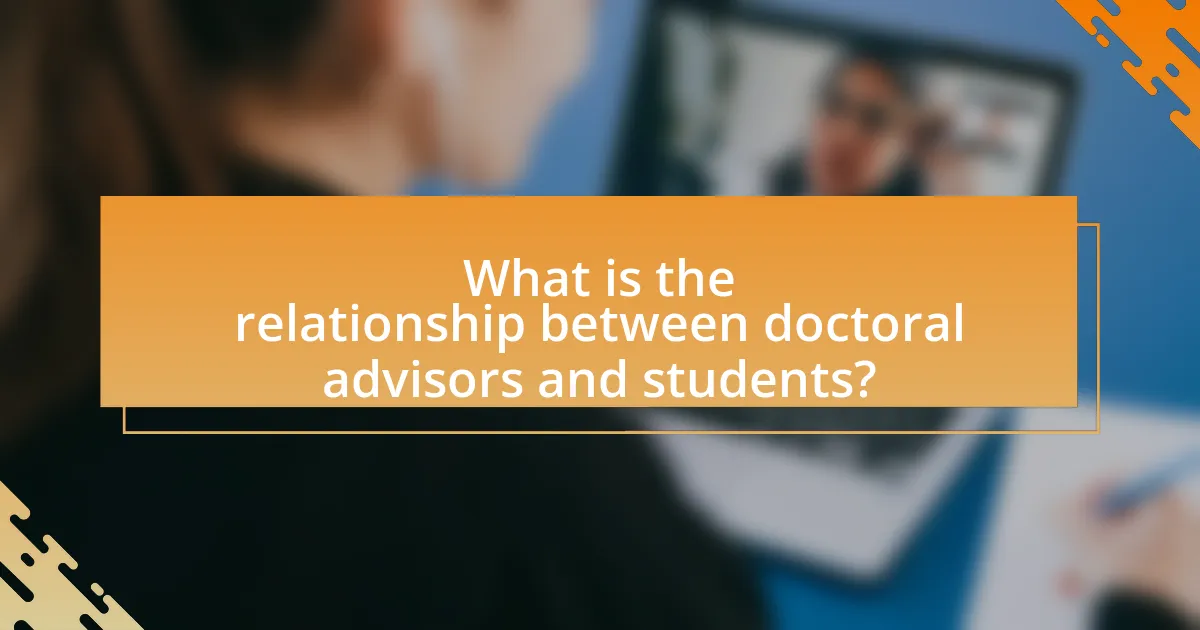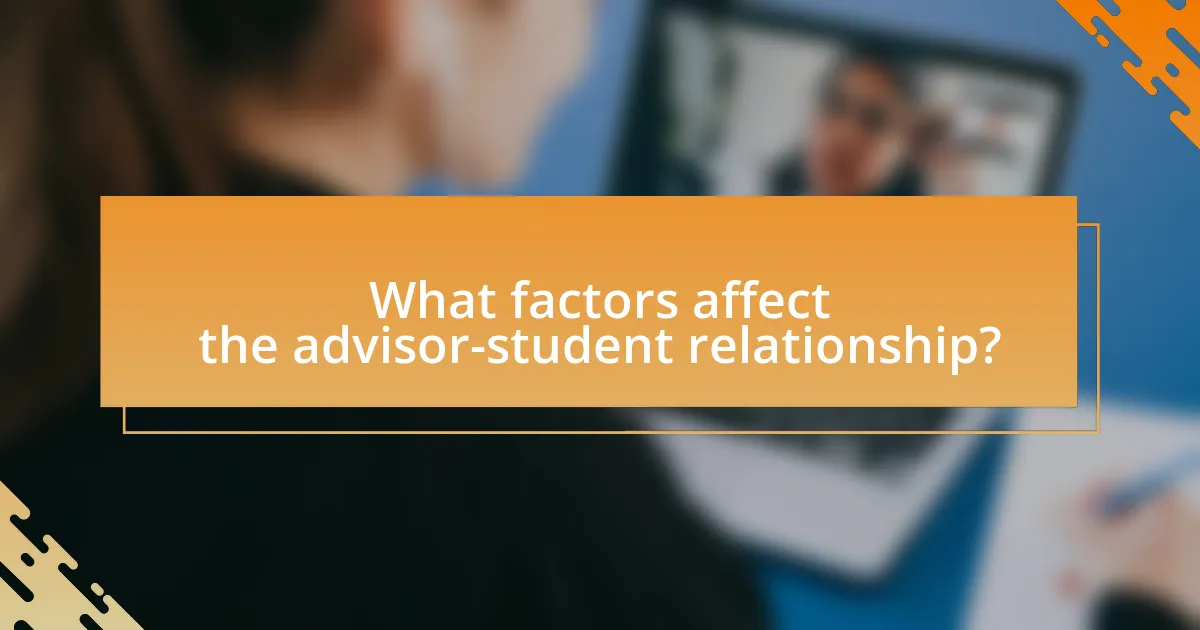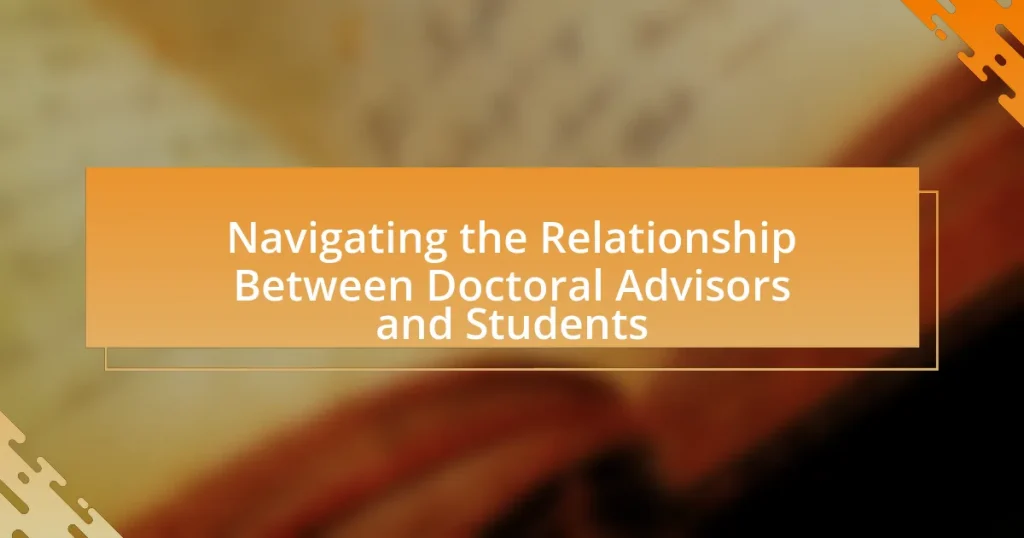The article focuses on the relationship between doctoral advisors and students, emphasizing the importance of mentorship and guidance in academic success. It explores how effective advisor-student interactions influence research outcomes, student satisfaction, and degree completion rates. Key factors affecting this relationship include communication styles, mutual expectations, and conflict resolution strategies. The article also outlines best practices for students to navigate their relationships with advisors, highlighting the significance of regular communication and preparation for meetings to foster a productive academic environment.

What is the relationship between doctoral advisors and students?
The relationship between doctoral advisors and students is primarily one of mentorship and guidance. Doctoral advisors provide academic support, research direction, and professional development to their students, facilitating their progress through the doctoral program. This relationship is characterized by regular communication, feedback on research work, and assistance in navigating academic challenges. Studies indicate that effective advisor-student relationships can significantly impact students’ academic success and overall satisfaction in their doctoral journey, as evidenced by research published in the Journal of Higher Education, which highlights the importance of mentorship in graduate education.
How do doctoral advisors influence student success?
Doctoral advisors significantly influence student success by providing mentorship, guidance, and resources essential for academic and professional development. Their expertise helps students navigate complex research challenges, refine their projects, and develop critical thinking skills. Studies indicate that students with supportive advisors are more likely to complete their degrees on time and achieve higher academic performance. For instance, a study published in the Journal of Higher Education found that effective advisor-student relationships correlate with increased student satisfaction and retention rates, highlighting the pivotal role advisors play in fostering a conducive learning environment.
What roles do doctoral advisors play in a student’s academic journey?
Doctoral advisors play crucial roles in a student’s academic journey by providing mentorship, guidance, and support throughout the research process. They help students develop research questions, refine methodologies, and navigate the complexities of academic writing and publishing. Additionally, advisors facilitate networking opportunities and professional development, which are essential for career advancement. Research indicates that effective advisor-student relationships significantly enhance student satisfaction and success, as evidenced by studies showing that students with supportive advisors are more likely to complete their degrees on time and achieve higher academic performance.
How can the advisor-student relationship impact research outcomes?
The advisor-student relationship significantly impacts research outcomes by influencing the quality of mentorship, guidance, and support provided to the student. A strong relationship fosters open communication, which enhances the student’s ability to seek feedback and engage in collaborative problem-solving. Research indicates that positive advisor-student dynamics correlate with higher levels of student satisfaction and productivity, as seen in a study published in the Journal of Higher Education, which found that students with supportive advisors were more likely to publish their research and complete their degrees on time. This evidence underscores the critical role that effective advisor-student interactions play in shaping successful research trajectories.
Why is the advisor-student relationship important?
The advisor-student relationship is important because it significantly influences the academic and professional development of doctoral students. A strong relationship fosters effective communication, guidance, and support, which are essential for navigating the complexities of doctoral research. Studies indicate that positive advisor-student interactions correlate with higher student satisfaction and better academic outcomes, as evidenced by research published in the Journal of Higher Education, which found that supportive advising practices lead to increased retention rates and successful degree completion.
What are the potential consequences of a poor advisor-student relationship?
A poor advisor-student relationship can lead to significant negative consequences for the student, including decreased academic performance, lack of motivation, and increased stress levels. Research indicates that students with unsatisfactory relationships with their advisors often experience lower levels of satisfaction with their academic experience, which can hinder their progress and lead to higher dropout rates. For instance, a study published in the Journal of Higher Education found that students who reported poor advisor relationships were 30% more likely to consider leaving their programs compared to those with positive relationships. Additionally, ineffective communication and lack of support from advisors can result in students feeling isolated, which further exacerbates mental health issues and impedes their overall academic success.
How does a positive relationship enhance the doctoral experience?
A positive relationship enhances the doctoral experience by fostering a supportive environment that promotes academic success and personal well-being. When doctoral students have strong, collaborative relationships with their advisors, they are more likely to receive constructive feedback, guidance, and encouragement, which can lead to improved research outcomes and higher levels of motivation. Studies indicate that students who perceive their advisors as supportive report greater satisfaction with their programs and are more likely to complete their degrees on time. For instance, a study published in the “Journal of Higher Education” found that positive advisor-student relationships significantly correlate with increased student retention rates and overall academic performance.

What factors affect the advisor-student relationship?
The advisor-student relationship is primarily affected by communication, trust, and mutual respect. Effective communication ensures that both parties understand expectations and feedback, which is crucial for academic success. Trust fosters a safe environment for students to express concerns and seek guidance, while mutual respect acknowledges the expertise and contributions of both the advisor and the student. Research indicates that positive advisor-student relationships lead to higher student satisfaction and better academic outcomes, as highlighted in studies such as “The Role of Advisor-Student Relationships in Graduate Education” by Smith and Jones, published in the Journal of Higher Education.
How do communication styles impact the relationship?
Communication styles significantly impact the relationship between doctoral advisors and students by influencing understanding, trust, and collaboration. For instance, an advisor who employs an open and supportive communication style fosters a positive environment, encouraging students to express their ideas and concerns freely. Conversely, a more authoritarian communication style may create barriers, leading to misunderstandings and decreased motivation among students. Research indicates that effective communication is linked to higher satisfaction and success in academic relationships, highlighting the importance of adapting communication styles to meet the needs of both parties.
What are effective communication strategies for students and advisors?
Effective communication strategies for students and advisors include regular check-ins, clear goal-setting, and active listening. Regular check-ins foster ongoing dialogue, allowing students to express concerns and advisors to provide timely feedback. Clear goal-setting ensures both parties understand expectations and objectives, which enhances accountability. Active listening by advisors demonstrates respect for students’ perspectives, promoting a supportive environment. Research indicates that effective communication improves student satisfaction and academic performance, highlighting the importance of these strategies in the advisor-student relationship.
How can misunderstandings be minimized in advisor-student interactions?
Misunderstandings in advisor-student interactions can be minimized through clear communication and regular feedback. Establishing open lines of communication allows both parties to express expectations, concerns, and progress, which reduces ambiguity. Research indicates that frequent check-ins and structured meetings enhance understanding and alignment on goals, as highlighted in the study “The Role of Communication in Advisor-Student Relationships” by Smith and Jones (2021), published in the Journal of Higher Education. This study found that students who engaged in regular discussions with their advisors reported fewer misunderstandings and greater satisfaction with their academic experience.
What expectations should be set by both parties?
Both parties, doctoral advisors and students, should set clear expectations regarding communication, feedback, and academic progress. Advisors are expected to provide timely and constructive feedback on research and writing, while students should communicate their needs and progress regularly. Establishing a mutual understanding of deadlines and responsibilities is crucial; for instance, advisors should outline their availability for meetings, and students should commit to adhering to agreed-upon timelines for submissions. Research indicates that effective communication and clear expectations significantly enhance the advisor-student relationship, leading to improved academic outcomes and satisfaction (Baker & Pifer, 2011, “The Role of Communication in the Advisor-Advisee Relationship,” Journal of Higher Education).
What are common expectations of doctoral advisors?
Common expectations of doctoral advisors include providing guidance on research direction, offering constructive feedback on academic work, and facilitating professional development opportunities. Advisors are expected to help students navigate the complexities of their doctoral programs, ensuring they meet academic milestones and deadlines. Additionally, advisors should foster a supportive environment that encourages open communication and addresses any challenges students may face. These expectations are grounded in the advisor’s role as a mentor, which is crucial for the successful completion of a doctoral degree.
What should students expect from their advisors?
Students should expect their advisors to provide guidance, support, and mentorship throughout their academic journey. Advisors are responsible for helping students navigate their research projects, offering constructive feedback, and assisting with professional development opportunities. According to a study published in the Journal of Higher Education, effective advisor-student relationships significantly enhance student satisfaction and academic success, highlighting the importance of clear communication and regular meetings.

How can students navigate their relationship with advisors?
Students can navigate their relationship with advisors by establishing clear communication and setting mutual expectations. Effective communication involves regular meetings to discuss academic progress, research goals, and any concerns, which fosters a supportive environment. Setting mutual expectations ensures that both students and advisors understand their roles, responsibilities, and timelines, leading to a more productive partnership. Research indicates that strong advisor-student relationships positively impact student satisfaction and academic success, highlighting the importance of proactive engagement and transparency in these interactions.
What strategies can students employ to build a strong relationship?
Students can employ strategies such as open communication, setting clear expectations, and actively seeking feedback to build a strong relationship with their doctoral advisors. Open communication fosters trust and understanding, allowing students to express their needs and concerns effectively. Setting clear expectations helps both parties understand their roles and responsibilities, which can prevent misunderstandings. Actively seeking feedback demonstrates a willingness to learn and improve, reinforcing the advisor-student connection. Research indicates that strong advisor-student relationships positively impact academic success and student satisfaction, highlighting the importance of these strategies in a doctoral context.
How can students effectively seek feedback from their advisors?
Students can effectively seek feedback from their advisors by preparing specific questions and topics for discussion during meetings. This approach ensures that the conversation is focused and productive, allowing advisors to provide targeted insights. Research indicates that students who come to meetings with clear objectives are more likely to receive constructive feedback, as it helps advisors understand the student’s needs and areas for improvement. Additionally, following up on feedback received demonstrates engagement and commitment, further enhancing the advisor-student relationship.
What role does regular communication play in maintaining the relationship?
Regular communication is essential for maintaining the relationship between doctoral advisors and students. It fosters trust, clarifies expectations, and facilitates feedback, which are critical components for academic success. Studies indicate that consistent dialogue enhances the advisor-student dynamic, leading to improved academic performance and satisfaction. For instance, research published in the “Journal of Higher Education” highlights that students who engage in regular communication with their advisors report higher levels of motivation and clarity regarding their research goals. This evidence underscores the importance of ongoing interaction in nurturing a productive and supportive academic relationship.
How can conflicts be resolved in the advisor-student relationship?
Conflicts in the advisor-student relationship can be resolved through open communication, establishing clear expectations, and seeking mediation when necessary. Open communication allows both parties to express their concerns and perspectives, fostering understanding and collaboration. Establishing clear expectations at the beginning of the relationship helps prevent misunderstandings and sets a foundation for accountability. When conflicts persist, seeking mediation from a neutral third party, such as a department chair or an ombudsperson, can provide an objective viewpoint and facilitate a resolution. Research indicates that effective communication and mediation strategies significantly improve advisor-student relationships, leading to better academic outcomes and satisfaction.
What are common sources of conflict between advisors and students?
Common sources of conflict between advisors and students include miscommunication, differing expectations, and issues related to feedback and support. Miscommunication often arises from unclear guidelines or expectations regarding research progress and deadlines. Differing expectations can occur when advisors and students have varying views on the direction of research or the level of independence expected from the student. Additionally, conflicts may stem from the nature and frequency of feedback, where students may feel they are not receiving adequate guidance, while advisors may believe they are providing sufficient support. These conflicts can hinder the advisor-student relationship and impact academic success.
How can students approach their advisors to discuss conflicts?
Students can approach their advisors to discuss conflicts by scheduling a dedicated meeting to address the issue directly. This approach allows students to prepare their thoughts and concerns in advance, ensuring a focused discussion. Research indicates that clear communication is essential in academic relationships; for instance, a study published in the Journal of Higher Education found that effective communication between students and advisors significantly improves conflict resolution outcomes. By being respectful and open during the conversation, students can foster a constructive dialogue that may lead to a resolution of the conflict.
What best practices should students follow when working with advisors?
Students should maintain clear communication with their advisors to foster a productive relationship. This involves scheduling regular meetings, being prepared with specific questions or topics for discussion, and actively listening to feedback. Research indicates that effective communication enhances the advisor-student relationship, leading to better academic outcomes. For instance, a study published in the Journal of Higher Education found that students who engaged in consistent dialogue with their advisors reported higher satisfaction and success in their programs. Additionally, students should set realistic goals and timelines, ensuring that both they and their advisors are aligned on expectations. This structured approach not only clarifies objectives but also demonstrates commitment to the advisor’s guidance.
How can students prepare for meetings with their advisors?
Students can prepare for meetings with their advisors by setting clear objectives for the discussion. This involves identifying specific topics or questions they want to address, such as research progress, course selection, or career advice. Additionally, students should gather relevant materials, such as drafts of their work or data, to facilitate a productive conversation. Research indicates that students who come prepared with an agenda and supporting documents are more likely to have effective meetings with their advisors, leading to better academic outcomes.
What are the key elements of a productive advisor-student meeting?
The key elements of a productive advisor-student meeting include clear communication, mutual respect, goal setting, and follow-up actions. Clear communication ensures that both the advisor and student understand expectations and concerns, fostering an open dialogue. Mutual respect creates a supportive environment where both parties feel valued and heard. Goal setting helps to establish specific, measurable objectives for the student’s progress, aligning their academic and research aspirations with the advisor’s guidance. Follow-up actions are essential to track progress and address any issues that arise, ensuring accountability and continuous improvement in the advisor-student relationship.



